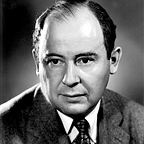Science and Futurism
Simulation Hypothesis and Free Will: A Dystopian Idea About The Machine That Generates “Good People”
Published in
5 min readOct 26, 2019
Keywords and ideas:
- Lack of free will → we cannot blame “bad people” to a certain extent;
- Simulation hypothesis → filtering out “bad people” and keeping people with the longest half-life in terms of behaving nicely (effective half-life);
- Effective half-life → the probability of the duration at which a design complies to certain criteria;
- Ineffective half-life → the probability of the duration at which a design does not comply to certain criteria;
- Change requires change → stop trying to do the same thing over and over again and expecting different results;
- Historical constraint → you have to build upon or change the old “parts” slowly over time;
- Satisficing → choosing “good enough” designs (rather than perfect ones);
- Possible criteria → filtering out designs with the longest effective half-life or shortest ineffective half-life + X% return on investment.
Abstract
S o I had this rather dystopian idea about a reason why simulating reality could be beneficial. If we don’t have…
